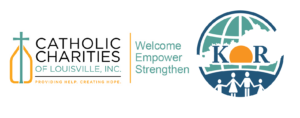Who is Eligible for Refugee Programming?
There are multiple immigration statuses that the federal Office of Refugee Resettlement (ORR) deems eligible for ORR-funded programs, the majority of which are offered for up to five years after arrival to the United States. Eligible statuses include:
Refugee
People admitted to the U.S. through the refugee resettlement program are eligible for all ORR funded programs and services. They also receive short-term services through the Reception and Placement (R&P) program, funded by the U.S. Department of State, Bureau of Population, Refugees and Migration (PRM). More information on the Refugee program can be found here.
Special Immigrant Visa (SIV) Program
This program is available to Iraqi and Afghani nationals who supported the U.S. armed forces as interpreters or translators, or Iraqi/Afghani nationals who were employed by or on behalf of the U.S. government in Iraq or Afghanistan for a period of at least 12 months, and who have experienced an ongoing serious threat as a consequence of that employment. These foreign nationals must self-petition for this special immigrant visa classification. More information on the Special Immigrant Visa (SIV) program can be found here.
Cuban and Haitian Entrant
The Cuban-Haitian Entrant Program (CHEP) is a federal program administered by U.S. Citizenship and Immigration Services (USCIS) at the U.S. Department of Homeland Security (DHS) to provide services to eligible Cuban and Haitian nationals. Individuals arriving through this program are eligible for refugee benefits and services. More information on the Cuban and Haitian Entrant program can be found here.
Asylee
When people flee their own country and seek sanctuary in another country, they apply for asylum – the right to be recognized as a refugee and receive legal protection. Just as with refugees, an asylee/asylum seeker must demonstrate that his or her fear of persecution in their home country is well-founded. If a person’s asylum case is approved, then they are eligible for refugee benefits and services. They are not eligible while their asylum case is pending, unless they are a Cuban or Haitian national. More information on the Asylee program can be found here.
Trafficking Victim
Individuals who receive a certification letter from the U.S. Department of Health and Human Services (HHS) due to being a victim of a severe form of trafficking are able to access services and benefits to the same extent as refugees. More information on Victims of Human Trafficking can be found here.
Secondary Migrant
This term is not an official immigration status but rather a descriptor used within the U.S. Refugee Resettlement Network to describe refugees who move from the state where they first were resettled to a different or “secondary” state. They can receive ORR funded services in a secondary state.
